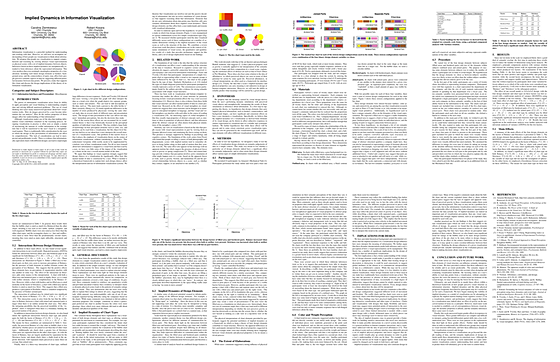Implied Dynamics in Information Visualization

Caroline Ziemkiewicz, Robert Kosara, Implied Dynamics in Information Visualization, Proceedings Advanced Visual Interfaces (AVI), pp. 215–222, 2010.Information visualization is a powerful method for understanding and working with data. However, we still have an incomplete understanding of how people use visualization to think about information. We propose that people use visualization to support comprehension and reasoning by viewing abstract visual representations as physical scenes with a set of implied dynamics between objects. Inferences based on these implied dynamics are metaphorically extended to form inferences about the represented information. This view predicts that even seemingly meaningless properties of a visualization, including such minor design elements as borders, background areas, and the connectedness of parts, may affect how people perceive semantic aspects of data by suggesting different potential dynamics between data points. We present a study that supports this claim and discuss the design implications of this theory of information visualization.
@inproceedings{Ziemkiewicz:AVI:2010,
year = 2010,
title = {Implied Dynamics in Information Visualization},
author = {Caroline Ziemkiewicz and Robert Kosara},
booktitle = {Proceedings Advanced Visual Interfaces (AVI)},
pages = {215–222},
abstract = {Information visualization is a powerful method for understanding and working with data. However, we still have an incomplete understanding of how people use visualization to think about information. We propose that people use visualization to support comprehension and reasoning by viewing abstract visual representations as physical scenes with a set of implied dynamics between objects. Inferences based on these implied dynamics are metaphorically extended to form inferences about the represented information. This view predicts that even seemingly meaningless properties of a visualization, including such minor design elements as borders, background areas, and the connectedness of parts, may affect how people perceive semantic aspects of data by suggesting different potential dynamics between data points. We present a study that supports this claim and discuss the design implications of this theory of information visualization.},
}
